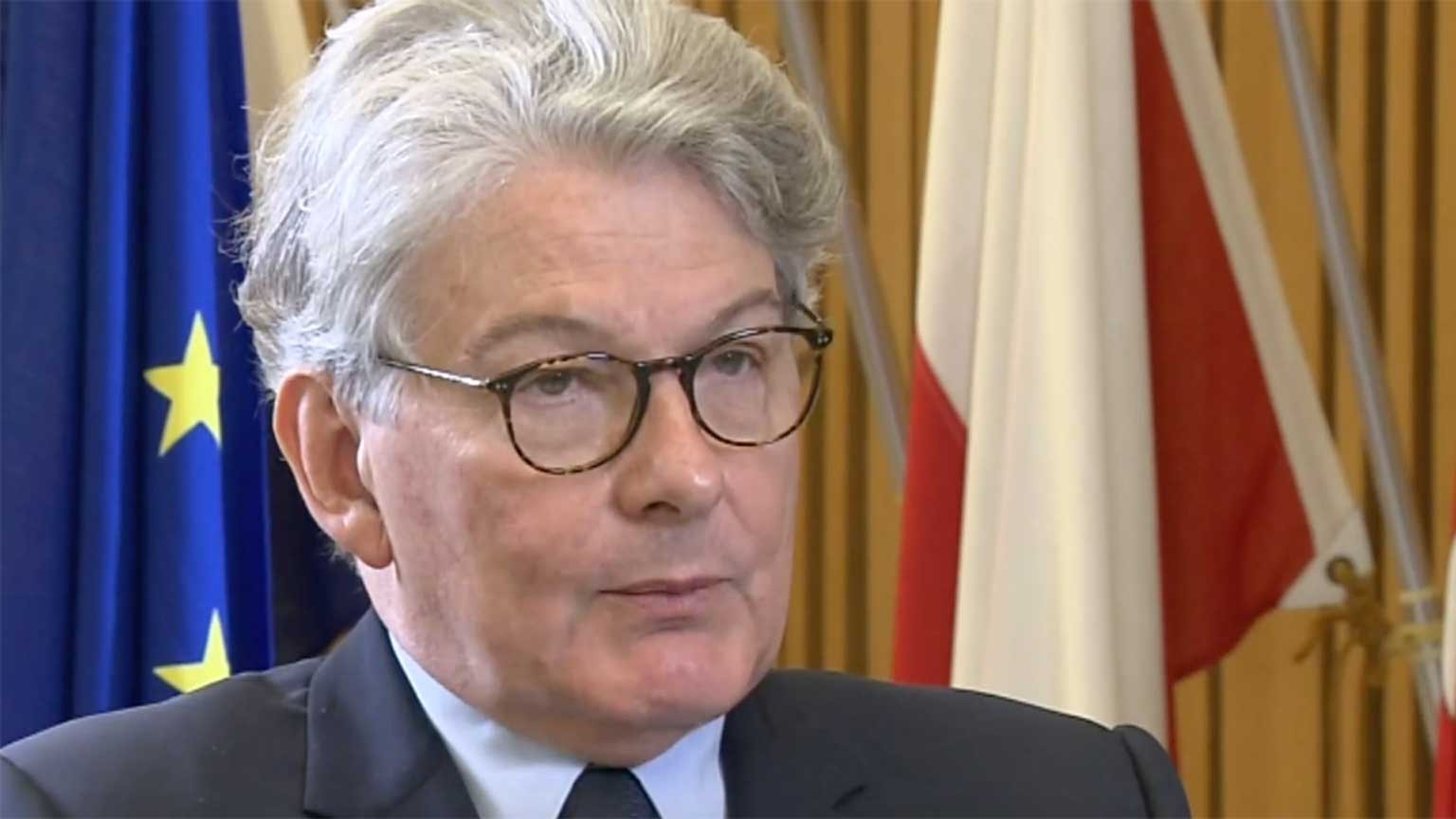Yoshioka Takuma: EU lawmakers have just agreed to revise the AI Act to include tighter regulations for generative AI such as ChatGPT. So could you tell us how significant it is?
Thierry Breton: Well, we are working on the necessity to regulate our digital space in Europe since more than four years now.
We did a lot of progresses. We have our DSA (Digital Services Act) to regulate our social network. We have our DMA (Digital Market Act) to make sure that we would have fair competition in the digital space. We are the first continent to do this, we believe, on such a comprehensive basis.
But of course, we are doing this also in AI, So we are now in the process to finalize what we call our AI Act. It has been finalized with the European Council, the 27 member states. They agreed their position.
It has been also finalized with our parliament. Parliament agreed its position now, so now we are in the final process. it will take probably two or three months and then it will be enforceable. And it's true that of course we will make sure that in this final process, we are also integrating all the risk behind generative AI. In other words, that's extremely important and when you use generative AI, you could make sure that it is done by an artificial intelligence. It could be an image, a picture, it could be a text, it could be a movie, it could be whatever. It's called watermarking. We believe it will be very important to have any outcome coming from AI, generative AI, being watermarked.
We believe also that it's extremely important to make sure that when this open AI strategy, or let's say using some data, you know what's happening with this data, where there could be trend, who could have access and not access. So there are some questions, relevant questions, that the parliament raised and that of course we will finalize now in the coming few months.
I discussed this, I was last week in San Francisco, and I met again the big platforms, because again, our regulation will be enforceable for the DSA in the end of August. So I wanted to make sure that the big platforms are ready. When I said the big platforms, we could think about Twitter, we could think about Meta. We could think about, of course, Google, but we have also TikTok -- who have been designated as a systemic platform and they will have to comply. But I met also ChatGPT's Sam Altman.
Yoshioka: Did he say that he would comply with all the requirements regulated in the AI Act?
Breton: Yes, he made it public. He told me this in a private discussion. But he made it public also that definitely he will comply, because he wants to be able to have access to the European market, and our European market will be, of course, open to anybody, or any company, but in order to benefit to have access to our European digital market, companies will have to fulfill with other obligation. I just remind you that our act is a risk-based regulation.
In other words, for most of the applications it will be no problem. Some who will have some constraints in the data sets or how data are trained, some will be a little bit more constrained, like for example everything in the ads, some will be forbidden, like social scoring, so this is a very consistent and coherent regulation and for the generative AI we will have a dedicated and specific also obligation.
But yes, he told me that he will of course fulfill this regulation, but you know, the European digital market is one-and-a-half bigger than the US market, so no company could afford not to be present.
And by the way, we are welcoming, and we want to work also a lot with the Japanese companies. There's a lot of capacities in AI and we are welcoming, we will love to develop, we will welcome of course any Japanese companies to have the willingness to come in the European market. And they will have just to fulfil this obligation. But I know that for Japanese, it will not be an issue.
Yoshioka: But we hear that the executives from more than 150 companies, including Europe's largest firms like Siemens, Airbus, Renault, have just issued an open letter. It says the draft legislation would jeopardize Europe's competitiveness and technological sovereignty. How would you respond to those concerns?
Breton: I have been a former CEO myself, working in the digital space for many, many years, including many decades and I know that in order to continue to be innovative, including new technologies, it's extremely important to start to have some rules.
A company needs to have rules and to have visibility. We are providing new rules now in the data space.
I mean, almost everything is authorized, but there are things that will be more strict. But it will be done. so then we know that in Europe we have the largest digital market with clear rules, which will offer for companies visibility and predictability. Which is exactly what we need to continue to be innovative.
Let me give you an image: When, in the beginning of the past century, the car industry started, it was a huge revolution for everyone in terms of mobility. And at the beginning there were no driving licenses. Everyone could drive in the street at that time. Then we start to see there's some accidents. We start to say, wait, you need to have a driving license. Then we start to see that could be a little bit dangerous, so we started to make the speed limit.
And it's true, big companies were not happy, and they were writing already some memos to say it's against innovation. Yes, but we innovate with the seat belt. It was an innovation with airbags, with radars. So regulation to protect again, to de-risk again. We don't have the ambition to say that risk will disappear.
When the new technology arrived you always at risk. But it is a job and a mission of politicians to put a regulation to reduce the risk, which will offer again to companies the ability to innovate to cope with these requirements.
So we need to invent the seat belt of tomorrow for AI or the airbag of tomorrow for AI.
Yoshioka: So you're aiming to establish a kind of global standard for the digital regulations?
Breton: It's not our goal. Our goal and our mission is to do it for Europe. I'm the European commissioner. I'm in charge of digital and my mission is to do this for our own European citizen and fellow citizens. I'm the European Commissioner. I'm only a European Commissioner,
Yoshioka: But you know that your regulation will affect all the other non-EU companies.
Breton: I don't know if it will, but what I could tell you is that we worked extremely hard for four years now, with a very large consultation already three years ago, so we already asked all the companies. We already asked all the academia to give us their input and it's done. We wrote this regulation. It is written now by our democracy. So if, yes, we could share our experience with our friends ... I mean I will volunteer of course to do this, but of course it will be probably a little bit different in Japan, maybe a little bit different in the US, even if I believe since we share the same value, and it is also value-based. I strongly believe that it will be close, and at the end of the day — this is also something that I will discuss with the ministers today and tomorrow — I think it's important to share the same objective. This is what we want to do in this global view, which has been proposed by the G7.
But of course, we are much deeper than this because we are already advanced in our regulation. And yes, we will be very happy to share this with our friends and partners and if it could be useful, we will be happy.

